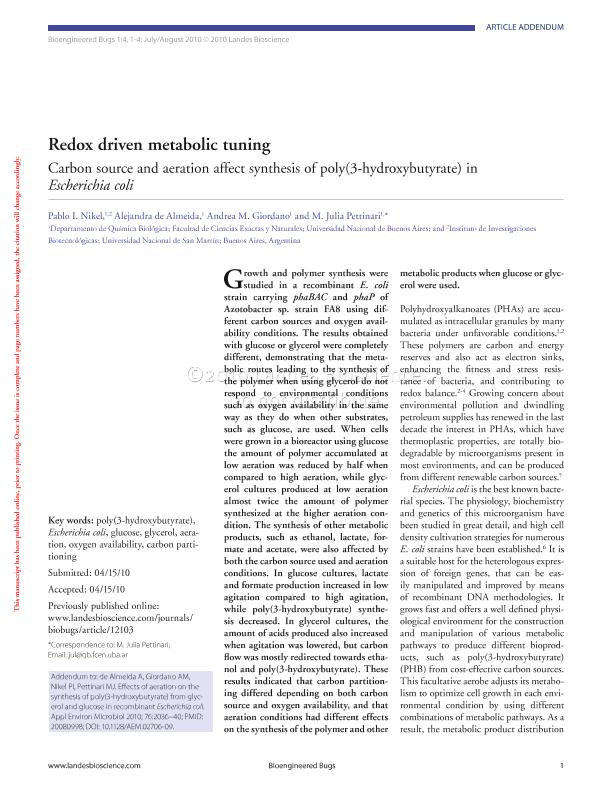Artículo
Redox driven metabolic tuning
Fecha de publicación:
10/2014
Editorial:
American Society for Microbiology
Revista:
Bioengineered Bugs
ISSN:
1949-1026
Idioma:
Inglés
Tipo de recurso:
Artículo publicado
Clasificación temática:
Resumen
Growth and polymer synthesis were studied in a recombinant E. coli strain carrying phaBAC and phaP of Azotobacter sp. strain FA8 using different carbon sources and oxygen availability conditions. The results obtained with glucose or glycerol were completely different, demonstrating that the metabolic routes leading to the synthesis of the polymer when using glycerol do not respond to environmental conditions such as oxygen availability in the same way as they do when other substrates, such as glucose, are used. When cells were grown in a bioreactor using glucose the amount of polymer accumulated at low aeration was reduced by half when compared to high aeration, while glycerol cultures produced at low aeration almost twice the amount of polymer synthesized at the higher aeration condition. The synthesis of other metabolic products, such as ethanol, lactate, formate and acetate, were also affected by both the carbon source used and aeration conditions. In glucose cultures, lactate and formate production increased in low agitation compared to high agitation, while poly(3-hydroxybutyrate) synthesis decreased. In glycerol cultures, the amount of acids produced also increased when agitation was lowered, but carbon flow was mostly redirected towards ethanol and poly(3-hydroxybutyrate). These results indicated that carbon partitioning differed depending on both carbon source and oxygen availability, and that aeration conditions had different effects on the synthesis of the polymer and other metabolic products when glucose or glycerol were used.
Archivos asociados
Licencia
Identificadores
Colecciones
Articulos(IIB-INTECH)
Articulos de INST.DE INVEST.BIOTECNOLOGICAS - INSTITUTO TECNOLOGICO CHASCOMUS
Articulos de INST.DE INVEST.BIOTECNOLOGICAS - INSTITUTO TECNOLOGICO CHASCOMUS
Articulos(OCA CIUDAD UNIVERSITARIA)
Articulos de OFICINA DE COORDINACION ADMINISTRATIVA CIUDAD UNIVERSITARIA
Articulos de OFICINA DE COORDINACION ADMINISTRATIVA CIUDAD UNIVERSITARIA
Citación
de Almeida, Alejandra; Giordano, Andrea Mariana; Nikel, Pablo Ivan; Pettinari, María Julia; Redox driven metabolic tuning; American Society for Microbiology; Bioengineered Bugs; 1; 4; 10-2014; 293-297
Compartir
Altmétricas




